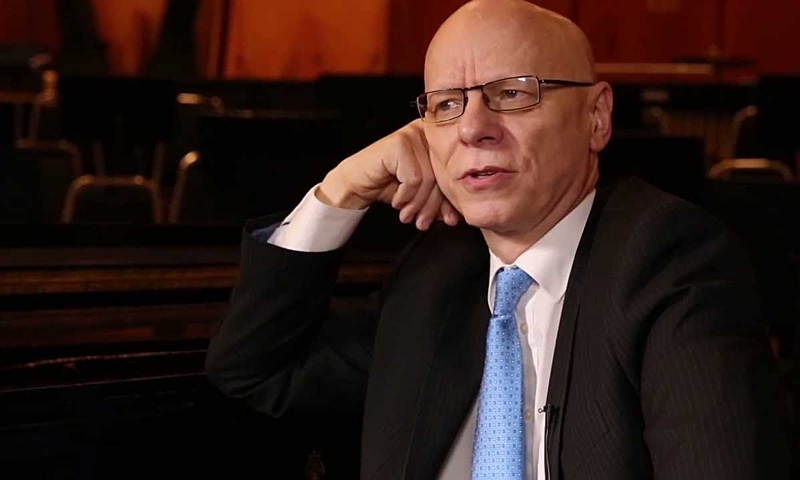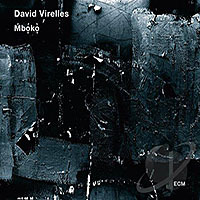Home » Jazz Articles » Interview » Jeremy Begbie: What can Jazz teach us about being a Christian?
Jeremy Begbie: What can Jazz teach us about being a Christian?

I recall that many jazz musicians had strong ties to the church; some whose music posthumously pointed to their Christian experience throughout their careers. Many musicians exhibited through harmony, tone, technique, and meter, a deep understanding of how their music and faith were, oftentimes, inseparably intertwined. Through a jazz artist's musical creativity, divine reverence and spiritual honesty manifests. A few examples would include the work of Duke Ellington, Dave Brubeck, who was a Catholic, and Donald Byrd who recorded Duke Pearson's "Cristo Redentor" (Christ the Redeemer) on New Perspective (Blue Note Records, 1963).
Consequently, some of 2014's most exciting albums have titles that reference scripture or point to the Christian life through fresh and complex compositions. Take for example Ambrose Akinmusire's "J.E. Nilmah (Ecclesiastes 6:10)" from The Imagined Savior is Far Easier to Paint (Blue Note), and drummer Otis Brown III's highly anticipated debut album, The Thought of You (Blue Note/Revive). The Thought of You features several faith inspired pieces such as "I Love You Lord / We Exalt Thee" and "The Two Shall Become One" which is a line found in the book of Genesis and the Gospel According to Mark. And last year, we even heard Kendrick Scott praying the famous prayer of St. Francis of Assisi on Conviction (Concord).
Thus with jazz, in conversation with Christian theology, one can further explore the mystery and splendor of God through delving deeper into its theory, looking inside the music at the rhythms, chord progressions, etc. This can be done through engaging themes that are explicitly spiritual and also those that are not. As a result, we find dazzling maxims and metaphorical associations concerning Christ's suffering on the cross, His resurrection and other biblical truths. Is there a connection between the Christian message and jazz? Is God telling us something about God's self or our lives through jazz music?
I sought out world renowned theologian Dr. Jeremy Begbie to further explore this phenomenon in jazz because he has a unique verve for probing the interconnection between theology and music. Begbie has an encapsulating way of thinking about music and the arts, that is, well, simply fascinating. After watching Begbie discuss theology, music, and the "jazz factor" in a video for church leadership, I was sure he could enlighten us on the issue. In the video, he gave viewers the challenge of finding coruscating theological truths by looking deeper into the music.
This is what makes him great. In addition to being a theologian, Begbie's notable experience includes being a brilliant author, a conscientious pastor, refulgent pianist and top-notch professor. He brings all his gifts and talents to his writings which exhibit enriched and innovative theological thought towards classical music and other genres such as rock, pop, and—jazz. In one of his talks, for example, one may easily get a music lesson that may engage Bach, Sufjan Stevens and a sermon—all rolled up into one. For this reason, he's become one of the top and most intriguing arts theologians in the world.
Over the past twenty six years, Begbie has penned many groundbreaking and dynamic works, taking the discourse on theology and arts higher to profusely engaging levels. Some of these include Theology, Music and Time, Voicing Creation's Praise: Towards a Theology of the Arts, Resounding Truth: Christian Wisdom in the World of Music, and his latest book, Music, Modernity and God. Resounding Truth received the 2008 Book Award in the Theology/Ethics category by Christianity Today.
Currently, Begbie teaches at Duke Divinity School in Durham, NC. In this interview, I engage him about the interface between jazz, pneumatological matters and the Gospel of Christ.
All About Jazz: What would you say is the connection between the deep pathos found within jazz music and the biblical notion of the seat of emotion?
Jeremy Begbie: A great deal of jazz has a streak of pathos, a kind of dark color to it, however joyful or celebratory the piece as a whole may be. A part of that is the pervasiveness of the blues, the blues scale, which brings a tinge of lament and restlessness to the music. Moreover, the blues brings to us the awareness of the fragility and sometimes the injustice of life. Jazz at its best faces up to these things, and actually incorporates those darker tones into a "bigger picture." That's the real miracle of this music: the way it can take up dissonance into a dynamic of hope. I think that's what the best kinds of jazz are doing.
AAJ: How can we relate this idea to the Gospel?
JB: Well, this is very basic to the Gospel, in that, injustice, suffering, and evil are not ignored but are faced and through the cross taken up into God's purposes. So there are very strong resonances here between jazz and the Christian faith.
AAJ: A lot of jazz musicians got their start playing within the church, and/or many have written jazz pieces as a sacred works, such as John Coltrane, Dave Brubeck, Duke Ellington. There are really too many to name. Would you say there is a connection between jazz and the divine Spirit?
JB: Well, it's a matter of record that jazz emerged out of spiritual roots. There's no doubt about that. Supremely from the spirituals. And I think God undoubtedly has used jazz for his purposes, over and over again. Having said that, I don't think the minute you play jazz you're necessarily directly in touch with God, but I think we can say that there are things in the way jazz works that make it very suitable for the conveying the Gospel.
In his explications on theology and music, one may often hear Begbie refer to the ideas of order and non-order. In his book, Resounding Truth: Christian Wisdom in the World of Music, he refers to David Ford and Daniel Hardy's concept of "non-order" and the "jazz factor." He speaks of the jazz factor as the "spontaneous element in the world and in human life that reaches its apogee in the unforced, unpredictable creativity of Jesus Christ." (Resounding Truth) In the Christian story, God the Creator works with ideas such as order, disorder, and non-order and within this improvisation is also at play. We asked Begbie to help us understand this.
AAJ: As a theologian and a musician, you've become praised in academia for brilliantly creating a discourse on theology and music. How can jazz help us unlock the great truths of the Gospel?
JB: There are a lot of things. For example, there is what I call the interplay between order and non-order, the predictable and the unpredictable, the regular and the irregular. The special power of jazz arises from the interplay between those two; which of course is the interplay behind improvisation. Why does this have Gospel significance? Because this is the way God operates. The Christian God is faithful. What we see right through scripture and the history of the church is a God who is consistent and faithful, not arbitrary or freakish. But this God also does the new thing, unpredictable and constantly surprising things. He doesn't repeat himself over and over again. The Bible tells the story of the interplay between these two dimensions of God's activity.
The way I like to illustrate this concept is by looking at our own lives. We often think there are really only two ways to live: the one is to live according to a strict order, and the other is to live in chaos or destructive disorder. So if someone comes into my office and it is reasonably tidy, they say, "Oh, this is very impressive Jeremy, it is incredibly well ordered and tidy." But if it's a mess, I apologize and say, "I'm sorry my office is a total tip, but do try and find a seat." The implication behind this example is that we are always shuffling between order and disorder. As if these were the only two options. But there is a third option, which is what we might call "non-order."
AAJ: Fantastic, please tell us more about non-order?
JB: Laughter would be a good example of non-order. Laughter is unpredictable, it bubbles up. You can't really control it easily, it just happens. So it is not ordered. But it is not destructively. It is neither order nor disorder. Speaking in tongues would be another form of non-order. It is unpredictable, you cannot predict that it would happen. But it's very fruitful when used properly; not destructive. Non-order is what David Ford, a Cambridge theologian, calls the "jazz factor." He uses the idea as a way of understanding the work of the Spirit in the world: the way God brings new things out of the old. This dynamic speaks right to the heart of jazz, but not only jazz—almost all music is improvised to a certain extent and involves this interplay between order and non-order. We can take that even further if you want. The Spirit of God takes the givenness of what Christ has achieved through His death and resurrection, and applies this work to our lives in different ways, in different times, and for different people. Thus, the Holy Spirit is the "Great Improviser," taking the givenness of the Gospel in Christ and making it live in different ways.
AAJ: That is great, I suppose the Holy Spirit is the "Great Improviser."
JB: Yes indeed. Moreover, we can learn other things about the Christian life from group improvisation. First, in group improvisation, you learn a great deal about trust. You learn to trust the others in the group, otherwise, the improvisation becomes forced. If we think of the Christian life in terms of improvisation, you can learn a lot about how Christians are meant to love and trust one another.
Second, in improvisation you learn how to receive something from another person and make the best of it, which is what I think Christian ethics is largely about. It is the Christian's job to make something out of everything that is given to us.
Within the Christian life there will be much improvisation. While God is a God of order, there is improvisation always occurring because, as Begbie notes, "the bible doesn't give us instruction for every occasion... it is more like a script in a play that you have to improvise both over and with." For the Christian, these improvisatory "sessions" are directed by the Spirit.
One thing many listeners and musicians love about jazz is that as an improvisatory music, it seems to lift off all constraints. But it is does not, there are constraints. However, the more a musician masters the theory, whether it be complex scales and rhythms, the more he/she is able to express musical freedom and go to higher heights in sonic expression. Begbie compares constraints and improvisation to God's laws. He says, "In the Old Testament, when God gave Israel His laws, they were not to make life hard." God's laws were "given out of love and so that the Israelites could live in a fulfilling and glorifying way." He notes, "So constraints are not an enemy, but negotiating and working within the constraints is where we find freedom." This moils a splendid biblical maxim. Like in jazz, the Christian life must have constraints but they are ultimately designed so that a believer can have more spiritual freedom from the murky, dark ways of a sinful world.
AAJ: Robert Glasper is one of my favorite jazz pianists, and on In My Element (Blue Note, 2007), at the end of a piece, one of the musicians says, "I think I played a funny note, maybe two." I thought that was great. Of course, if there was actually a wrong note, the group is so brilliant, it was cleverly covered up. In jazz music, once you've made a mistake, there is no going back, but you mentioned that it can be a passing note? What is jazz and passing notes telling us here? How can we review mistakes as a passing note?
JB: I think a passing note in jazz can tell us about forgiveness. It can tell us that when we mess up, however badly, God doesn't give up on us. God can take the very worst things of our lives and turn them into the very best. That is what forgiveness is all about. Our worst mistakes can be taken up into the Christian story; God can make something out of them. A good jazz musician (or any musician, for that matter) knows that if you make a hash of something, you don't gloat over the hash but you try to weave it into the texture and make something of it. A supreme demonstration of that is seen in God's work in Christ—in the cross and resurrection, the very worst situation becomes the very best.
AAJ: How can jazz inform the life of the local church?
JB: Well, jazz music can teach us a lot about the importance of tradition. All jazz is rooted in a relatively stable stream of tradition. The proper jazz musician doesn't despise tradition and is not always trying to escape from it. The good jazz musician works within the tradition and sees the tradition as an opportunity for creativity. I think that is basic to the way a church should be working. We shouldn't despise tradition and the wisdom that comes from it, but work within it where we can, and make things out of it.
AAJ: What advice would you give jazz musicians who struggle to find a Christian audience for their music?
JB: That's a very tough question. Jazz is very often under suspicion.
AAJ: It is. And it has so many ties to the church. The church could learn so much about theology from the music and the theory if it was taught well.
JB: Absolutely. Well, I think you've answered your own question. I think we need teaching in the Church to show the spiritual roots of jazz, to show that it has not always been thought of as being against the Gospel. Also, many jazz musicians have been people of faith and have explored matters of faith. Coltrane would be an obvious example. Moreover, I think jazz should be demonstrated well—speaking and teaching as you are demonstrating so you're taking people into the music, explaining about how jazz works, why it was written, and the possibilities it affords. In addition, there are jazz vespers services cropping up all over the place. These are great opportunities for people to hear, and hear about jazz in the service of the Gospel. Besides, there are probably very few people who don't like any jazz!
Tags
Jeremy Begbie
Interview
K. Shackelford
United States
North Carolina
Charlotte
duke ellington
Dave Brubeck
Donald Byrd
Duke Pearson
ambrose akinmusire
Otis Brown III
Kendrick Scott
John Coltrane
Robert Glasper
PREVIOUS / NEXT
Support All About Jazz
 All About Jazz has been a pillar of jazz since 1995, championing it as an art form and, more importantly, supporting the musicians who make it. Our enduring commitment has made "AAJ" one of the most culturally important websites of its kind, read by hundreds of thousands of fans, musicians and industry figures every month.
All About Jazz has been a pillar of jazz since 1995, championing it as an art form and, more importantly, supporting the musicians who make it. Our enduring commitment has made "AAJ" one of the most culturally important websites of its kind, read by hundreds of thousands of fans, musicians and industry figures every month.

























